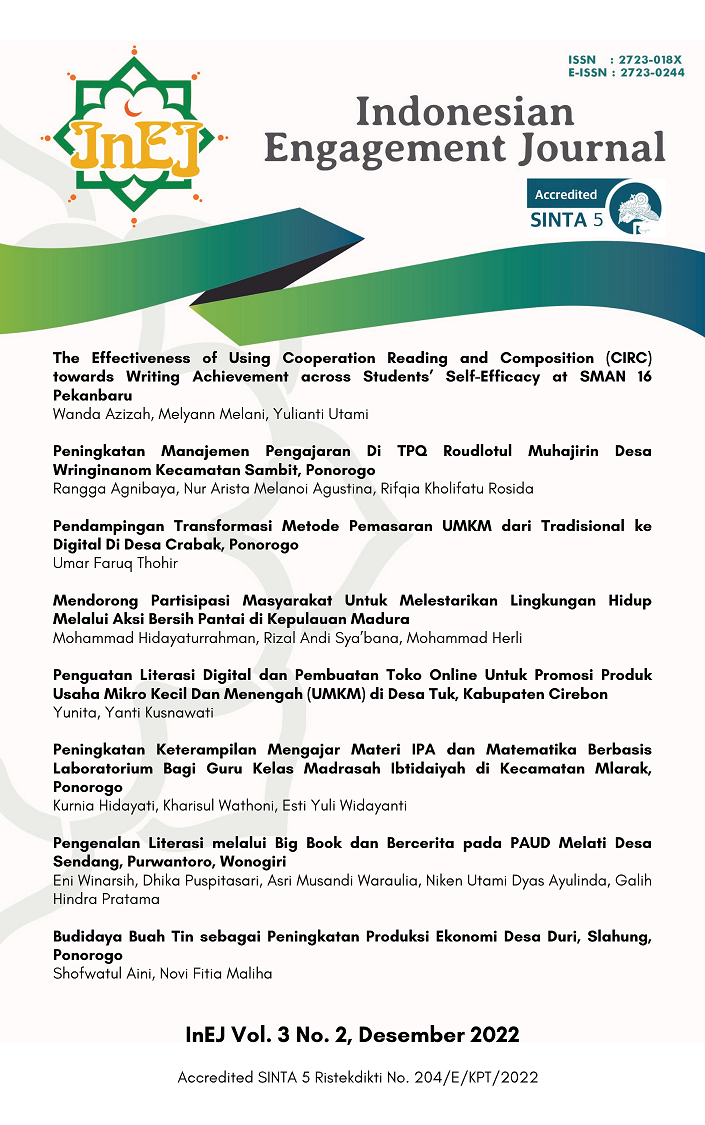BUDIDAYA BUAH TIN DALAM RANGKA PENINGKATAN PRODUKSI EKONOMI DESA DURI, SLAHUNG, PONOROGO
DOI:
https://doi.org/10.21154/inej.v3i2.5309Abstract
Abstrak:
Salah satu cara untuk meningkatkan perekonomian suatu desa bisa dilakukan dengan memanfaatkan aset yang dimilikinya. Di desa Duri Kecamatan Slahung Kabupaten Ponrorogo memiliki aset yaitu tanaman buah tin. Para petani buah tin sudah menanam buah tin kurang lebih 3 tahun tetapi banyak diantara mereka yang bekum mengolahnya menjadi suatu produk yang bernilai jual tinggi. Oleh karena itu pengabdian ini memiliki dua rumusan masalah yaitu Bagaimanakah budidaya dan pengolahan buah tin agar menjadi produk yang bernilai jual tinggi dan Bagaimanakah pengaruh pengolahan buah tin terhadap pola pikir warga Duri dalam kaitannya dengan peningkatan ekonomi. Pengabdian ini menggunakan metode ABCD dimana penekanan utamanya adalah memanfaatkan aset yang ada. Pengabdian ini dilakukan dalam bentuk sosialisasi budidaya dan pengolahan buah tin di desa Duri. Dari pengabdian bisa disimpulkan bahwa untuk pengolahan buah tin agar menjadi produk yang bernilai jual tinggi diperlukan kesabaran dan ketelatenan. Selain itu, pengolahan buah tin menjadi produk yang bernilai jual tinggi dapat menggugah pikiran warga desa Duri untuk berwirausaha.
Keywords: Buah tin, ABCD, peningkatan ekonomi
Abstract:
One of the way to raise the economic development of a village can be done by using the asset that they have maximally. Duri village is a part of Slahung district in Ponorogo East Java that has many assets, which one of these is Tin fruit. The farmers have planted this fruit for three years, but most of them sell only the fruit. They have not cultivated Tin fruit become something that has a high value economically. Based on this, the research has two main problems to overcome. First, how to plant and cultivate the tin fruit become something with high value economically, and how this cultivating process can influence the mindset of Duri people in becoming a businessman. This research uses ABCD method where the main stressing is on using the asset. To do this, the engagement is conducted in form of the socialization on planting and cultivating Tin fruit in Duri village. The result is to cultivate Tin fruit become something with high value economically needs patience and diligent. In addition, the socialization of cultivating Tin fruit can stimulate the mindset of Duri people to become an entrepreneur.
Keywords: Tin fruit, ABCD, raise the economy
References
Kartika Putri, Oktavina dan Wahyu Wuryandari, “Efek suhu penyeduhan daun tin (Ficus carica) segar dan kering terhadap kadar fenolik total” Jurnal Teknologi Pangan, Vol. 12 N0. 2 Desember 2018
Khasanah, Nur “Kandungan buah-buahan dalam alqur’an: buah tin (ficus carica l), zaitun (olea europea l), delima (punica granatum l), anggur (vitis vinivera l), dan kurma (phoenix dactylifera l) untuk kesehatan” Jurnal Phenomenon, Volume 1 Nomer 1, Juli 2011
Mubyarto (1997), Ekonomi Rakyat, Program IDT dan Demokrasi Ekonomi Indonesia, Yogyakarta: Aditya Media.
Rahimah, Desi Sayidatil dan Eny Pujiastuti (2016), Prospek Bisnis Buah Tin. (Depok: Pt Trubus Swadaya).
Tim Penyusun, Pedoman Kuliah Pengabdian Masyarakat Daring Dari Rumah (KPM-DDR), (Ponorogo: LPPM IAIN Ponorogo, 2021)
Triharyanto, Eddy dan Kristiandi, “Peningkatan Ketersediaan Bahan Baku Daun Tin pada Usaha UKM Barokah Desa Plupuh Sragen Jawa Tengah”, JKB Vol. 23, No. XII 2018.
Suherman, Enjang, Pemanfaatan Buah Tin untuk Kesehatan dan Ekonomi”, Jurnal Buana Pengabdian, Volume I Nomer 1, Februari, 2019
Laporan KPM kelompok 34 IAIN Ponorogo, desa Duri kecamatan Slahung kabupaten Ponororogo.
https://www.sindopos.com/2016/02/profil-desa-kelurahan-desa-duri.html
https://id.wikipedia.org/wiki/Budi_daya.
https://id.wikipedia.org/wiki/Tin.
http://jatengpos.co.id/aneka-olahan-buah-tin-rambah-pasar-online/.
https://ponorogo.go.id/2021/07/03/mulai-hari-ini-pemkab-berlakukan-ppkm-darurat
Downloads
Published
Issue
Section
License
Please find the rights and licenses in InEJ. By submitting the article/manuscript of the article, the author(s) agree with this policy. No specific document sign-off is required.1. License
The non-commercial use of the article will be governed by the Creative Commons Attribution license as currently displayed on Creative Commons Attribution-NonCommercial-ShareAlike 4.0 International License.
2. Author(s)' Warranties
The author warrants that the article is original, written by stated author(s), has not been published before, contains no unlawful statements, does not infringe the rights of others, is subject to copyright that is vested exclusively in the author and free of any third party rights, and that any necessary written permissions to quote from other sources have been obtained by the author(s).
3. User/Public Rights
The spirit of InEJ is to disseminate articles published are as free as possible. Under the Creative Commons license, InEJ permits users to copy, distribute, display, and perform the work for non-commercial purposes only. Users will also need to attribute authors and InEJ on distributing works in the journal and other media of publications. Unless otherwise stated, the authors are public entities as soon as their articles got published.
4. Rights of Authors
Authors retain all their rights to the published works, such as (but not limited to) the following rights;
Copyright and other proprietary rights relating to the article, such as patent rights,
The right to use the substance of the article in own future works, including lectures and books,
The right to reproduce the article for own purposes,
The right to self-archive the article,
The right to enter into separate, additional contractual arrangements for the non-exclusive distribution of the article's published version (e.g., post it to an institutional repository or publish it in a book), with an acknowledgment of its initial publication in this journal (InEJ: Indonesian Engagement Journal).
5. Co-Authorship
If the article was jointly prepared by more than one author, any authors submitting the manuscript warrants that he/she has been authorized by all co-authors to be agreed on this copyright and license notice (agreement) on their behalf, and agrees to inform his/her co-authors of the terms of this policy. InEJ will not be held liable for anything that may arise due to the author(s) internal dispute. InEJ will only communicate with the corresponding author.
6. Royalties
Being an open accessed journal and disseminating articles for free under the Creative Commons license term mentioned, author(s) aware that InEJ entitles the author(s) to no royalties or other fees.
7. Miscellaneous
InEJ will publish the article (or have it published) in the journal if the article’s editorial process is successfully completed. The editors of Journal may modify the article to a style of punctuation, spelling, capitalization, referencing and usage that deems appropriate. The author acknowledges that the article may be published so that it will be publicly accessible and such access will be free of charge for the readers as mentioned in point 3.




